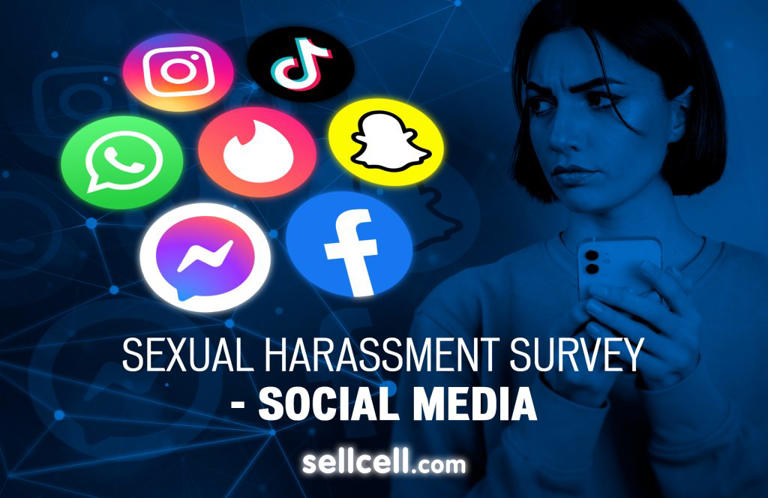Last Updated on: 22nd November 2023, 10:28 am
Introduction:
SellCell, a leading online mobile phone price comparison site, in collaboration with OnePoll, conducted a survey to examine the prevalence of online sexual harassment against women on social media platforms. The purpose of the survey was to gain insights into the firsthand experiences of women and their observations regarding sexual harassment.
Key Findings:
The survey encompassed 3,000 active female social media users from the UK, and the results shed light on the following key findings:
- Personal Experiences of Sexual Harassment:
- Approximately 20.8% of women (1 in 5) have personally encountered sexual harassment on social media.
- When considering both personal experiences and instances witnessed, the figure rises to 39.7% (4 in 10) of women affected by sexual harassment online.
- Social Media Platforms:
- Among women who experienced sexual harassment, 57% reported encountering it on Facebook and Facebook Messenger.
- The majority of unwanted advances and sexual comments were received through unwelcome messages, as stated by 79% of the affected women.
- Actions Taken:
- Around 76% of women who experienced sexual harassment on social media took action by blocking the harasser(s).
- Long-term effects of such harassment included feelings of violation and/or intimidation for 32% of the victims.
- Protection by Social Media Companies:
- An alarming 68.2% of the surveyed women expressed their dissatisfaction with the efforts of social media companies in safeguarding individuals against online sexual harassment.
Summary of Survey Questions:
The survey posed several questions to the 3,000 UK women who actively use social media platforms. These questions revolved around the topic of sexual harassment on social media, aiming to gather relevant data. The responses to key questions were as follows:
Question 1: Experiences of Sexual Harassment:
- Out of the respondents, 39.7% acknowledged experiencing or witnessing sexual harassment on social media platforms or apps.
- Of the total respondents, 20.8% confirmed their personal experiences of sexual harassment on such platforms.
Question 2: Reasons for Avoiding Personal Experience:
- Among women who had not personally experienced sexual harassment, 69% attributed their safety to being selective in choosing whom to follow or accept friend requests from.
- Furthermore, 42% maintained private social media accounts, while 41% refrained from sharing personal information due to concerns about platform safety.
Question 3: Platforms/Apps Associated with Sexual Harassment:
- A significant portion (57%) of women who experienced sexual harassment identified Facebook and Facebook Messenger as the primary platforms for such incidents.
- Instagram was mentioned by 37% of the respondents, and dating apps like Tinder or Hinge accounted for 26% of the reported cases.
- Surprisingly, even professional networking platform LinkedIn was cited by 4% of the victims.
Question 4: Types of Sexual Harassment:
- Unwelcome sexual comments or messages constituted the most prevalent form of harassment, as reported by 79% of the victims.
- Additionally, 59% expressed discomfort with receiving friend requests or invitations from strangers.
- Offenders sending explicit photos or videos constituted 48% of the reported cases.
- Threats of sexual violence affected 9% of the victims.
Question 5: Reporting and Action Taken:
- Of the women who experienced sexual harassment, 76% resorted to blocking the harasser(s).
- 42% reported the offenders to the respective social media platforms.
- A small fraction (5%) took the matter to the police, but regrettably, 11% felt discouraged from taking any action, perceiving inaction from platforms and authorities.
Question 6: Long-Term Effects:
- Regarding the long-term effects of online sexual harassment, 32% of women expressed feeling violated and/or intimidated.
- Furthermore, 21% developed doubts about their personal appearance, while 19% reported suffering from anxiety.
- The harassment negatively impacted 10% of victims’ current intimate relationships, and 3% experienced career setbacks due to the offenders’ actions.
Question 7: Perception of Social Media Companies:
- A significant majority of 68.2% (2,045 women) believed that social media companies were not doing enough to combat sexual harassment on their platforms.
- Only 7.8% felt that sufficient measures were being taken, while 24% remained unsure about the adequacy of companies’ efforts to protect female users from sexual harassment.
To access the full report, please visit: (https://www.sellcell.com/blog/social-media-sexual-harassment-survey-2023/)








